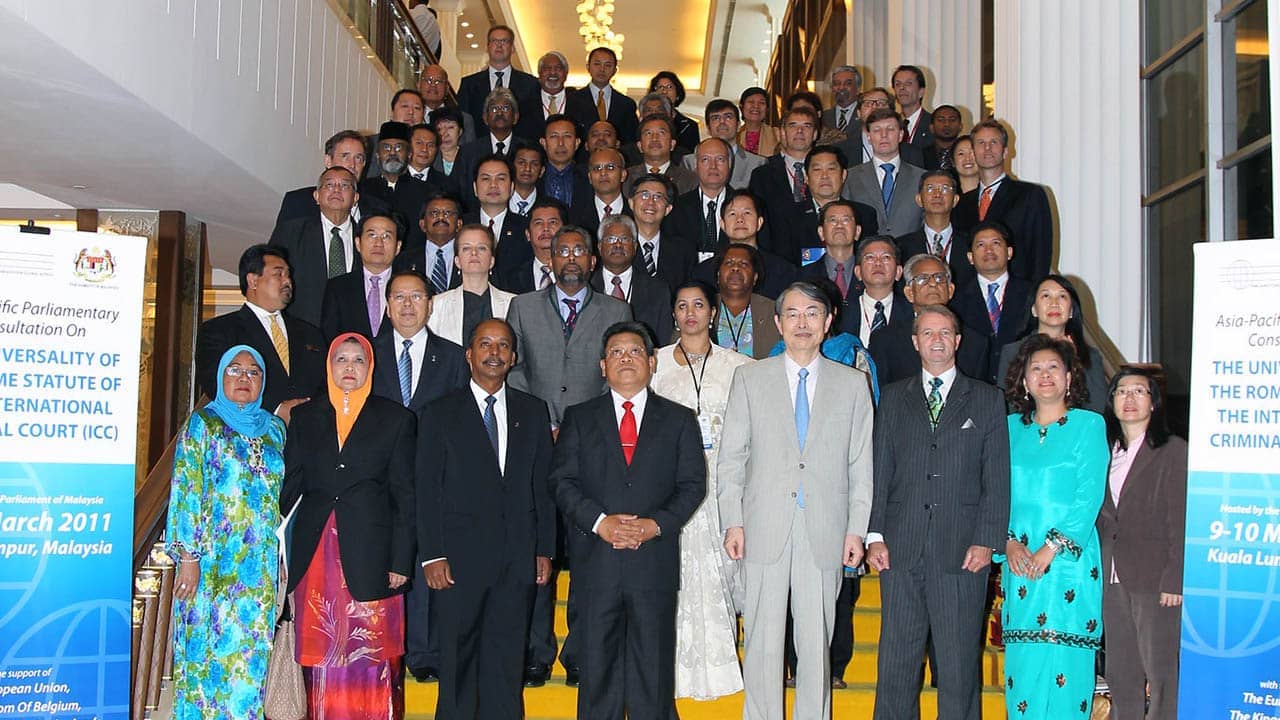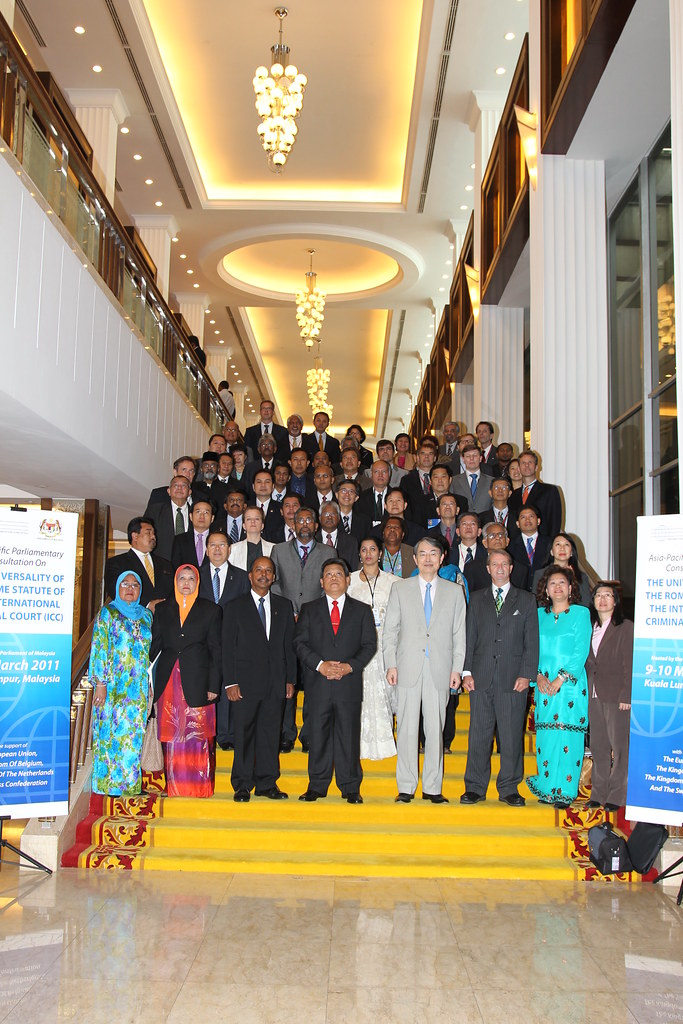
March 9-10, 2011 | Parliament of Malaysia, Kuala Lumpur
Following on from the First PGA Asian Consultation on the ICC held in the House of Representatives in The Philippines four years ago, the purpose of this second Consultation was to review current ratification and implementation processes of the Rome Statute in a number of countries in the region, including in particular in Malaysia, with a view to identifying the most effective means to moving these respective processes forward.
The universality of the ICC is, and remains, a condicio sine qua non to it achieving lasting effectiveness and global deterrence against the repetition of the most serious crimes of international concern, genocide, crimes against humanity and war crimes, which shall not be left unpunished. The Asia-Pacific region is under-represented in the Rome Statute system: PGA therefore invited to this regional event representatives from Bangladesh, which has been the last Asian country to ratify the Statute in 2010, and from the following non-States Parties to the Rome Statute: Indonesia, Kiribati, Malaysia, The Maldives, Nepal, The Philippines and Vanuatu.
Participants in this event included the President of the ICC, Judge Sang-Hyun Song, who opened the Consultation with a key note address, the Executive Committee Member of PGA from the Asia-Pacific, Mr. Ross Robertson, MP (New Zealand) and 55 prominent legislators from the Asia-Pacific region, led by the Minister of Law and Parliamentary Affairs in the Malaysian Prime Minister Dept. Mr. Mohammed Nazri, MP and Mr. M. Kula-Segaran, MP (opposition), respectfully Chair and Secretary of the PGA Malaysia Organising Committee. The Opening Session was also addressed by the welcoming remarks of the Head of the European Union Delegation in Malaysia, Amb. Vincent Piket.
Underscoring PGA's longstanding commitment to ensuring that all voices are heard at its Regional Workshops and Seminars worldwide, and to ensure the highest level of credibility and integrity of such PGA events, the second day of this Asia Pacific RegionalConsultation was opened with the sceptical statement of the Attorney General of Malaysia Tan Sri Abdul Gani Patail (Malaysia Should Not Ratify ICC Just To Look Good, Says Gani Patail - Bernama, 10 March 2011).
However, both the Director-General of the Ministry for Foreign Affairs in charge of International Law and Treaties, Ambassador Dr. Farida Ariffin, and Minister Nazri provided the Consultation with forceful counter arguments in support of the full consistency between the Malaysian Basic Law and the Rome Statute of the ICC. Minister Nazris welcome address was firm in indicating that a pro-accession policy-decision would shortly be forthcoming from the Malaysian Cabinet.
It is my fervent and sincere personal hope that after this Seminar more Asian countries will be persuaded to ratify the Rome Statute. The world events these past two months are evidence of the urgent need for more countries to be part of the ICC.
What moves me personally reasonably enough is not the realisation that the world falls short of being completely just, which few of us expect anyway, but that there are clearly remediable injustices around us which we want to eliminate. It has always been our policy to condemn and penalize perpetrators of the most atrocious acts.
Malaysia's participation would certainly enhance its international prestige and inspire other Asia-Pacific nations as well. It would be a significant contribution to the promotion of international criminal justice. International justice is one of the most important expenditures a Government can invest in, not only for prevention, but also to help reconcile conflict situations in the world. The ICC observes the highest standards of fairness and due process. [...]
The ICC needs unflinching support from the world community. Its integrity and fairness needs to be constantly enhanced and safeguarded by the international community, and that includes us - the Asia-Pacific community. Let us together try to put an end to unimaginable atrocities that have plagued humankind for far too long. [...]
Let us henceforth not further hesitate to ratify the Rome Statute. [Applause] Let it not be stated again that this region is under-represented. Now it is an excellent time for us to adopt a stronger role in the ICC. What better time than now to show that in our conviction of our common destiny and our common responsibilities to forge an harmonious, peaceful and prosperous society in which justice will prevail. Cf. Minister for Law and Parliamentary Affairs in the Prime Minister's office, Mr. Mohammed Nazri, MP: Opening Address, Parliament of Malaysia, Kuala-Lumpur, 9 March 2011.
Many MPs took the floor to report on important progress in the relevant countries concerning the ratification or accession to the Rome Statute.
Sen. Miriam Defensor-Santiago (The Philippines) reported on the decision of the recently installed new President of the Philippines, H.E. Benigno Aquino II to transmit to the Senate the ICC Ratification Bill, a step that PGA Parliamentarians had petitioned for, and requested the Executive to undertake since the latter signed the Rome Statute in December 2000.
PGA was honoured to be part of a Delegation that on March 7, 2011 made a courtesy call on President Aquino along with Judge Song during the latter's recent visit to Manila. Also on 7 March 2011, the President of the ICC, Judge Song, addressed the Senate's Foreign Relations Committee on the basis of an invitation issued by long-standing PGA member Sen. Loren Legarda, Chair of the Foreign Relations Committee that has now included the Ratification bill in its agenda (see for more information: Briefing of the Senate Foreign Relations Committee by Judge Song.
Senator Legarda has given an assurance that Senate concurrence should be forthcoming, by the latest, June 8, 2011, the final day of the current session of the Senate. Sen. Defensor-Santiago announced that a positive vote of two-thirds of Filipino Senators, as required by the Constitution of the Philippines to authorize the Executive to be bound by an international treaty, shall occur very likely within a month from the Kuala-Lumpur Consultation, as she will serve as Chair of the relevant Senate's Foreign Relations' Sub-Committee. In 2009, the Congress of the Philippines adopted another piece of legislation that Sen. Defensor Santiago introduced in Parliament Republic's Act 9851 of 9 December 2009, which criminalizes war crimes, crimes against humanity and genocide in Filipino domestic penal law.
The Attorney General of The Maldives, Mr. Ahmed Sawad and the leader of the youth wing of the main opposition party, Mr. Ahmed Malhoof, MP (PGA member) took the floor to indicate that they had been inspired by the bipartisan efforts of their Malaysian colleagues and were looking forward to a common strategy to de-block the ICC Accession Bill, which stagnates in a parliamentary Committee in Male since October 2010 due to misunderstandings and misconceptions surrounding the limited jurisdictional scope of the Rome Statute. At the end of the Kuala-Lumpur's Consultation, Mr. Malhoof affirmed that 'the ICC mandate must be better understood. We therefore would like to receive an expert on the ICC to brief Parliament to clarify pending issues.' In The Maldives, the opposition controls the majority of votes in Parliament.
Two representatives of Pacific Islands States actively contributed to the Consultation's proceedings. The Speaker of the Parliament of Kiribati, Hon. Taumati Iuta, welcomed the progress on the relationship between the ICC and key Non-States Parties to the Rome Statute and announced a full briefing to Parliament and Government to advance the accession process. Similarly, the Head of the Women's Wing of Vanua'aku Party - Greens Confederation of Vanuatu, Ms. Maryline Arnhambat Abel, reported that she will table a pro-ICC ratification Report before Parliament and will encourage the Government to make a step that Vanuatu has already agreed when it accepted the terms of article 11.6 of the revised Cotonou Agreement between the Africa-Caribbean-Pacific (ACP) and the European-Union (EU).
Dr. Aziz Syamsuddin, MP (Indonesia), Deputy-Chair of the Justice and Human Rights Committee, reported on the renewed commitment of the Indonesian Parliament in promoting the Accession to the Rome Statute, which however must be transmitted by the Executive to the Legislature for the necessary assent to membership in the Rome Statute system. Accession has been included for the third time in the National Plan for Human Rights (2010-14) by the Indonesia Administration. Follow-up meetings held in Jakarta by a PGA delegation confirmed the determination of PGA Indonesian Members, to be led by Dr. Lily Wahid, MP, to re-launch the ICC Accession process in the 4 largest country in the world.
In a written report submitted to the Consultation, Dr. Dr. Arzu Rana Deuba, Member of the Constituent Assembly of Nepal, explained the reasons that, to date, have effectively halted the ICC ratification process in Nepal notwithstanding the significant impact of the country-specific PGA projects held in Kathmandu in September 2007 and December 2008, when the ICC President was accompanied by a PGA delegation to meet with the Chairman of the largest party in Nepal's Assembly tasked with writing the new Constitution after 18 years of deadly civil war. Nevertheless, PGA Members are determined to re-start the action to achieve Nepals ratification of the Rome Statute, which requires the concurrence of all political groups in the Constituent Assembly, including those formerly engaged in the armed conflict.
Last, but not least, a bipartisan delegation from the Parliament of Bangladesh, led by Mr. Hafiz Ahmed Mazumdar, MP (majority) and Ms. Nilufar Chowdhury Moni, MP (opposition) underscored the importance of the fight against impunity for sustainable democratic systems built on the Rule of Law and geared towards enhancing the protection of human rights. Bangladeshi MPs committed to work towards the full implementation of the Rome Statute into national law, including through a new law on cooperation with the Court.
The PGA Consultation benefitted from the participation of the Malaysian Bar Association, which coordinated the NGOs belonging to the NGO-Coalition for the ICC (CICC) in Kuala-Lumpur, as well as from the active participation of many concerned representatives from academia and civil society. The CICC was present through its Asia-Coordinator, Ms. Evelyn Serrano (the Philippines). Also the diplomatic community based in Malaysia participated widely in the Consultation's proceedings, starting with the Ambassadors of PGA donor-countries Belgium, The Netherlands and Switzerland.
A technical Panel on complementarity and cooperation inspired Law-makers to take into consideration the serious implications of accession vis-à-vis the domestic legal order: Mr. Daniel Kooij, ICC Policy Advisor of the Foreign Ministry of The Netherlands, provided enlightening details concerning the cooperation regime that States must apply in their relationship with the Court, which is relies entirely on law-enforcements apparatus of a State to carry out its binding order and judicial decision. Prof. Dr. Abdul Ghafur Hamid of the International Islamic University-Malaysia described the complementary character of the ICC jurisdiction and the primary obligation of national Court to carry out investigations and prosecutions for Rome Statute crimes, thus urging the Malaysian Legislator to incorporate the Rome Statute crimes into the national penal law.
At the end of the Consultation, a Plan of Action was adopted, incorporating certain essential steps that each of the Asia-Pacific countries that attended this event should undertake to achieve accession to or ratification of the Rome Statute, which needs the participation of all countries of this region to ensure that the new permanent system of international criminal justice will be truly universal and effective in its jurisdictional reach.




